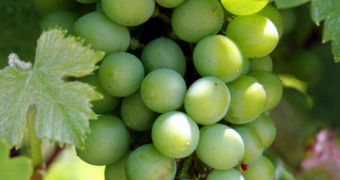A new study claims that if climate change continues at this rate, then by 2080 areas such as the Thames Valley, some areas in Hampshire and the Severn valley would ultimately become too hot to be able to continue wine production. The study was published today in a book written by Emeritus Professor Richard Selley from the Imperial College London.
Selley believes that in the next 75 years or so, the locations in the UK used today for wine production would turn to a climate similar to that of North Africa and Middle East and will become suitable for the cultivation of raisins, currents and sultanas. Furthermore, the Yorkshire and Lancashire areas of the UK could become proper for vines such as Merlot and Cabernet Sauvignon, cultivated today in the warmer regions of France and Chile.
The British vineyards have been successfully growing 'cool' Germanic grape varieties for the last century or so, while grapes adapted to intermediate temperatures have only become popular in the last two decades.
Temperature predictions combined by Professor Selley with the whole history of UK vineyards show that as the temperatures steadily increased, the species of wine adapted to cool and intermediate temperatures have been pushed towards the northern regions of the British isles, leaving room for the 'hot' varieties that are now flourishing in the southern and mid regions of England.
"My previous research has shown how the northernmost limit of UK wine-production has advanced and retreated up and down the country in direct relation to climatic changes since Roman times. Now, with models suggesting the average annual summer temperature in the south of England could increase by up to five degrees centigrade by 2080, I have been able to map how British viticulture could change beyond recognition in the coming years. Grapes that currently thrive in the south east of England could become limited to the cooler slopes of Snowdonia and the Peak District", Professor Selley said.
"This research shows how the environment in the UK could be affected by climate change in a relatively short period of time. Increases in temperature over the course of this century could have a dramatic effect on what can be grown here, including vines", said Professor Sir Brian Hoskins, Director of the Grantham Institute for Climate Change at Imperial College London.

 14 DAY TRIAL //
14 DAY TRIAL //